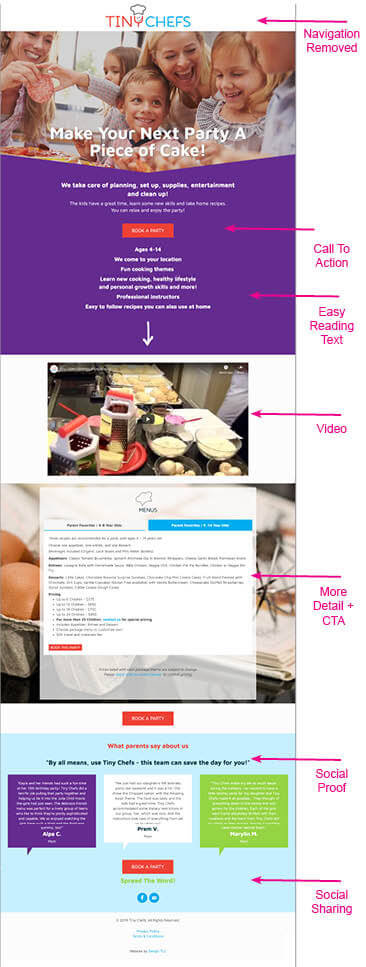Why Landing Pages Can Help Your Business
… And What Exactly Is A Landing Page?

Photo by Terje Sollie from Pexels
Let’s start with what a Landing Page is NOT.
Many people refer to the “Home Page” of their website as a “Landing Page.” You could argue that any page someone lands on could be referred to as a “Landing Page.” (And in fact, to Google Analytics, a landing page IS the first page viewed in a session, or the entry point to your website.) However, in technical terms, when it comes to website marketing “lingo,” a landing page is not the main Home Page or any basic page of a website. (You can learn some more technical website jargon here.)
Most digital marketers think of a landing page as a webpage intended to get their visitors to perform one action – purchase, sign up or opt-in.
A Landing Page is Used for Tracking Specific Marketing Campaigns
For marketing and website development, a landing page is a standalone web page, created specifically for the purposes of a marketing or advertising campaign. It is designed with a single focused objective, known as a Call to Action (CTA). This may be a call to make a purchase, sign up for an email list or fill out a contact form. A landing page helps measure the results of paid advertising campaigns, such as Google Adwords.
When you run paid ad campaigns, you specify where the link in the ad takes your visitors. You could, of course, send them to your website’s homepage. A standalone landing page created specifically for that ad campaign will be more effective and make your campaign more measurable.
Why a Landing Page is Not a Home Page
You basic homepage introduces your website to your visitors. It offers them opportunities to explore your content through navigation and links on the page that take them to different content on your site.
Landing pages should have ONE focus, which relates to the offer/message in the corresponding advertisement. If your ad is promoting a discount on your best product, and the user clicks on your ad and comes to your main Home Page, they will be less likely to make a purchase because they will have to look for that offer and product, and will be distracted by everything else on your Home Page. By contrast, a landing page that is ONLY about the offer from the ad, with a clear and easy to follow purchase link, is more effective. .
Different Types of Landing Page
There are two basic structural types of landing page:
- Lead Generation landing pages use a web form as the Call to Action, for the purpose of collecting lead data such as names and email addresses. Business to Business campaigns are often lead generation because there is not a product to sell.
- Click-Through landing pages have a simple button as the Call to Action. These are typically used for e-commerce, usually to make a purchase.
Why Are Landing Pages Used?
Landing Pages increase your conversion rates and lower your cost per sale/lead. You can increase the likelihood of converting targeted traffic into leads by using a targeted landing page.
Landing pages help you gather information about the people visiting your website, help you understand them, market to them, and ultimately convert them into customers.
How To Make Your Landing Page Effective
Focus is key since visitors came to your site from and ad that had a specific message that caused them to click the link! Make sure you only have one thing people can focus on and not a lot of different things.
- Limit Distractions and Navigation. It can be helpful to remove your website’s standard header navigation from your landing pages to avoid distraction. In some cases, you may want to allow your visitors to see some of your offerings from the navigation. However, in general, it is a best practice to remove the navigation. Conversion rates can increase by having fewer links and distractions on your landing page
- Present a compelling offer/call to action. Make your offering appealing to your users. You can test different offers to see which ones drive the most response/conversion.
- Offer Social Proof: Social Proof is a way to establish trust with your potential customers. This is often in the form of testimonials from happy campers! You can also show social proof via indicators of your social status.
- Enable Sharing: Tap into the free marketing opportunity offered by social sharing links.
- Keep it short and straightforward to increase your conversion rate. It is tempting to add a ton of content on a long, scrolling page. Stay focused and make you message compelling and make the process for your visitor easy.
- Consider video to increase engagement and personalize your page. It provides a passive engagement medium where visitors can experience your message with very little effort. A study by eyeviewdigital.com shows that using video on landing pages can increase conversion by up to 80%.
- Test and analyze results to make improvements. Pay attention to the data offered by Google Analytics to review the behavior of people coming to your website. Consider using applications that will make it easy to conduct A/B Tests, such as Optimizely or Hubspot.
Here is an example of a landing page we recently created for Tiny Chefs kid’s birthday parties.
